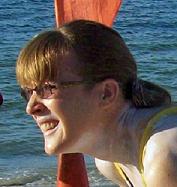Swim Faster with Relaxation
It may seem like a contradiction to link swimming and relaxation, but many professional athletes have discovered that faster speeds can be obtained by relaxing your mind and body. By adding relaxation techniques to your swimming practices, you should find you increase efficiency and you can swim faster. Have you ever seen amateur swimmers that make a lot of splash, while kicking their feet and flailing their arms, in an effort to move through the water, quicker? Maybe that’s how you feel in the water? Swimming is not a power sport. Less resistance by relaxing in the water will make a more graceful and speedier endurance swimmer – in essence a better swimmer.
You may have noticed that fast and frantic strokes or kicking is an ineffective approach to swim faster. You may have a bad case of “trying too hard”, when it comes to increasing speed, by incorporating more motion. You have to discover the zone where your mind and swimmers body work in perfect synchronicity, because being physically and mentally-aligned will eventually lead to more effective technique and speed.
Your mind needs to be clutter-free, in order to focus on your ultimate goal, which is to swim faster. If you learn how to relax more, you will be better able to focus on the finish line and your body will instinctively work in the most efficient manner to get you there. Like a cat staring down a bird, ocean life going about their business in the water, the mind will be focusing on the proper movements and communicating with the body, in order to provide the needed speed and motions, to be the most effective.
It’s important to realize that peak performance should be measured in years and not by a single event. Athletes with proper techniques and training or practicing principles will tell you they’re a good foundation to swim faster, but finding a comfortable speed and relaxing at higher speeds, is possible. While good technique and plenty of practice are part of the foundation for athletic success in any sport, higher heart rate and more exertion isn’t always the best approach, when learning how to swim faster.
In fact, if you over-exert yourself, it’s no doubt your heart rate will increase, but your effectiveness may suffer, as you tire quicker. By tapping into the deep reserves of your core muscles, you’ll be to allow your arms to relax more, at higher speeds. This is the key to mastering the “chi” required to swim faster. Efficiency, instead of effort, equals speed.
Tri-athletes have used this approach to gain faster speeds, in all areas. Spending less energy to go faster speeds may seem impossible, but it’s important to realize that speed is directly-related to efficiency. It isn’t always about energy expenditure, when learning to swim faster. Making a big splash in the pool doesn’t mean you’ll make it to the other end any quicker than the relaxed, natural swimmer, who seems to effortlessly glide through the water.
Making your arm strokes more efficient may allow you to reduce the stroke counts. A clear mind and plenty of energy reserves can make you think efficiency-versus energy expenditure. Relaxation exercises can be helpful to release stress, keep your heart rate lower and they can also help you swim faster. Streamlining your swimming position, learning your most buoyant form, improving your stroke or kicking technique and moving through the water like a natural swimmer, will increase speed. Along with the proper mind and body connection, you will find you swim faster, using this approach.
Your swimming tempo can be increased as you practice keeping your heart rate lower, through the use of daily relaxation exercises. Before entering the swimming pool, you can spend a few minutes, practicing relaxation techniques. It’s simple to sit upright and breathe deeply for a few minutes, which pumps more oxygen to your muscles and relieves muscle tension.
Try tensing every muscle in your body and then, relaxing them from head to toe. You can relax better when you tense your upper body, your belly, upper legs and then, your lower legs and feet. Breathe deeply and then, systematically, relax each muscle. This entire process only takes a couple of minutes, but through practicing daily relaxation techniques, you may find you can swim faster and obtain better focus, with optimal efficiency. Tri-athletes will tell you they use mind and body synchronicity, to be successful. In Chi running or Chi walking, you allow gravity to pull you forward, while holding your posture in proper alignment, between strides. By letting your lower abs and pelvis muscles do all the work, the rest of your body’s muscles can be relaxed. For Chi in swimming, the same principles are applied.
In order to reap the most benefit from the “necessary” muscle groups, the “unnecessary” muscle groups need to be relaxed, which allows your mind to send more energy to the parts of the body that need it most. This will allow you to swim faster, while keeping your heart rate at lower levels.
For the best benefits, your relaxation exercises should become a daily habit, whether you are swimming or just spending a day at work. Releasing tension, while dropping pre-conceived notions of how you should perform, will allow you to combine the mental and physical aspects required to swim faster. You’ll have a healthier body, get more enjoyment out of life and with a relaxed “chi”, your technique and speed will improve, when swimming.
back to the top of relaxation page
from relaxation page to better swimming page
Don't just build a website, build a web business!
Beauty is just a click away! Visit me, your Independent Beauty Consultant.
Do you have a Favorite Training Style?
Are you still searching for your favorite training style? Or have you figured out what your favorite training style is? Share it!









